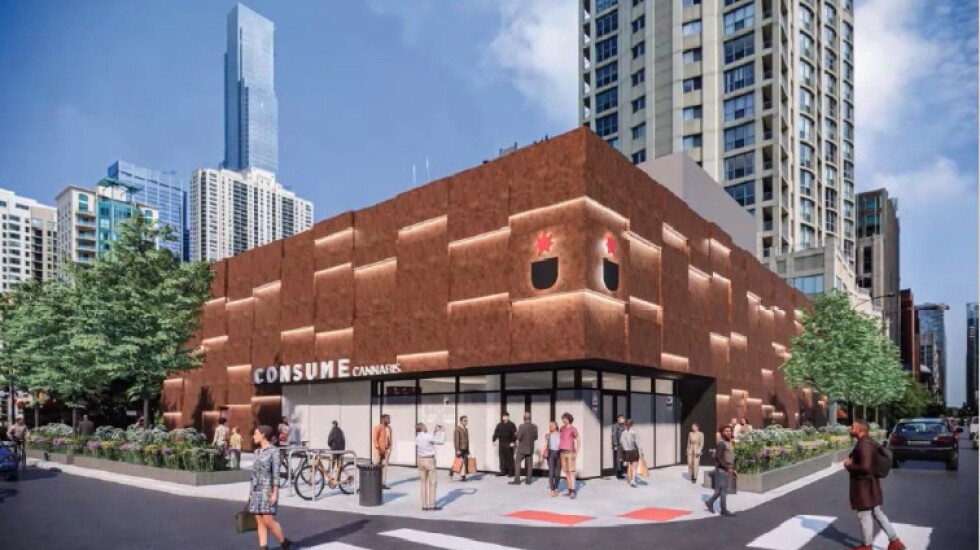
A politically connected firm pushing to open dozens of pot shops in Illinois is suing to prevent a dispensary from opening in the former River North Rainforest Cafe — and to restrict how close minority-owned cannabis shops can be to one another.
The lawsuit filed Monday in Cook County by GRI Holdings, a clouted firm with deep ties to state government, claims that the proposed Consume Cannabis dispensary at 605 N. Clark St. violates state law by opening within 1,500 feet of its Green Rose Dispensary at 612 N. Wells St.
Both pot businesses are owned by social equity applicants, and therefore not restricted by a state law preventing pot shops from opening within 1,500 feet of an existing weed shop.
The idea behind the exception was to give minority-owned pot businesses a leg up on big weed shops that claimed some of the best territory years before the social equity licenses were issued.
But the suit claims that the exception — that social equity pot shops can open right next to each other — is a misinterpretation of the state law by the Illinois Department of Financial and Professional Regulation, which issues state cannabis licenses and is named as a defendant.
That misinterpretation creates a “ripple effect [that] would theoretically permit dozens of social equity applicants to open dispensaries next door to one another,” the lawsuit claims.
The suit claims that social equity pot shops should be allowed to open near large multistate operators, but not within 1,500 feet of other social equity license holders.
Four dispensaries already operate within 1,500 feet of the proposed shop.

Making arguments similar to those in the lawsuit, more than a dozen state lawmakers sent a letter to the state’s pot regulation department last month, asking that it revise guidelines so social equity businesses can’t open near one another.
The law “was never envisioned to permit social equity licensees to set up within 1,500 feet of each other, as this would likely foster an overly competitive environment that could hamper the growth and success of these new enterprises. This crucial distinction seems to have been overlooked in the current guidance,” the lawmakers wrote.
The Illinois Department of Financial and Professional Regulation won’t comment on the lawsuit.
But department officials argue, despite the lawmakers’ letter, that they will continue allowing social equity businesses to open within 1,500 feet of each other.
“We welcome further legislative clarity on this complex issue, recognizing that zoning matters are generally best enforced by local governments,” according to a statement.
State Rep. La Shawn Ford, D-Chicago, signed the letter asking that the state restrict social equity businesses from opening too close to each other.
But Ford on Tuesday said he now thinks it should be up to municipalities, not the state, to determine how close pot shops can open to each other — even if they’re both minority owned. He’s also open to changing the law if business owners ask for it.
“If the social equity business owners come to the Legislature after the court ruling and ask for a fix, I would definitely call for hearings,” Ford said. “But [for now] it should be left to home rule for municipalities to decide.”
Controversy has swirled around the former Rainforest Cafe location since the restaurant closed in 2020.
The city zoned the spot for a weed dispensary for Bio-Pharm in November 2022, after a River North resident sought to block the move by questioning if the company was actually a social equity applicant.
Bio-Pharm, which owns Consume Cannabis, did not immediately reply to a request for comment.
GRI’s management roster is made up of a clouted mix of insiders and others with ties to state politics, including restaurant mogul Phil Stefani, former Chicago Police commander Thomas Wheeler Jr. and former CTA official John Trotta. In 2020, GRI Holdings LLC filed 25 applications for licenses to open cannabis dispensaries in Illinois.







